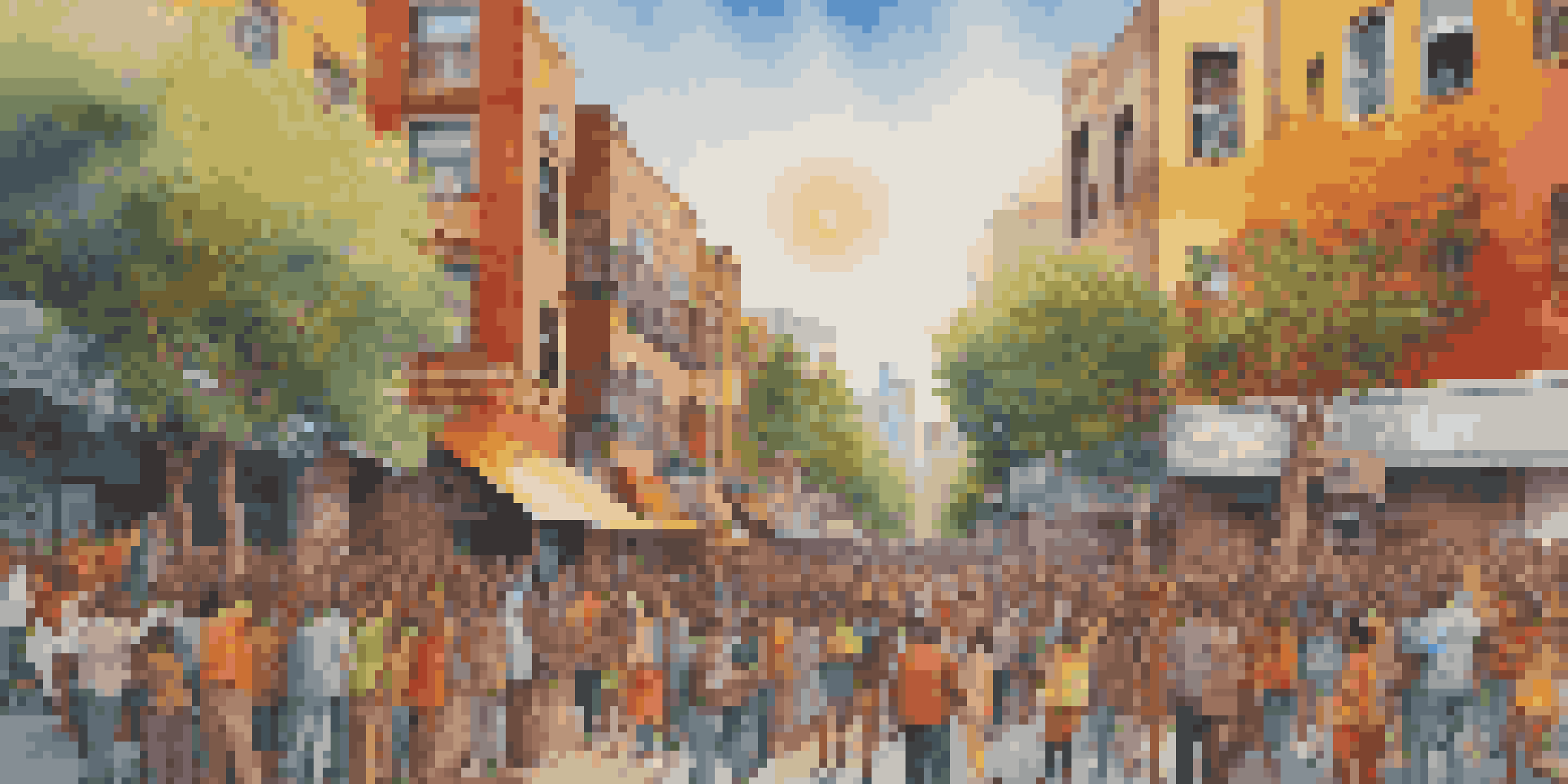Art and Identity Politics: Ethical Implications in Expression

Understanding Art's Role in Identity Politics
Art has long been a means of expressing personal and collective identities. From paintings to performances, artists often use their work to explore cultural heritage, social issues, and personal experiences. This connection between art and identity politics invites viewers to reflect on their own identities and the societal structures around them.
Art is a reflection of society, and it carries the responsibility of telling the stories that matter.
However, this intersection raises important questions about representation and voice. Who gets to tell certain stories in art, and whose perspectives are often overlooked? These inquiries are crucial in understanding the ethical implications of artistic expression within identity politics.
Ultimately, the role of art in identity politics is both powerful and complex. It serves not only as a reflection of individual experiences but also as a catalyst for broader social change. By engaging with these themes, artists and audiences alike can foster deeper dialogues about identity and belonging.
The Ethics of Cultural Appropriation in Art
Cultural appropriation is a controversial topic in the realm of art, particularly when artists adopt elements from cultures outside their own. This practice can lead to misunderstandings and misrepresentations, often trivializing the very identities being portrayed. Understanding the line between inspiration and appropriation is essential for ethical artistic expression.

For instance, consider an artist who incorporates traditional motifs from a marginalized culture into their work. While this can be a celebration of that culture, it becomes problematic if the artist lacks a genuine connection or understanding of its significance. This raises questions about ownership and respect within the artistic community.
Art Reflects Identity and Society
Art serves as a powerful medium for expressing personal and collective identities, prompting reflection on societal structures.
Navigating these ethical waters requires sensitivity and awareness. Artists must ask themselves whether their work contributes to or detracts from the narrative of the culture they are engaging with. By doing so, they can ensure their art enriches the conversation around identity rather than silencing it.
Art as a Medium for Marginalized Voices
Artistic expression has always been a powerful avenue for marginalized voices to be heard. Whether through visual arts, literature, or performance, creators from underrepresented backgrounds often use their work to challenge dominant narratives and advocate for social justice. This empowerment is crucial in the context of identity politics.
Cultural appropriation is a form of theft; it's taking something that isn't yours and exploiting it for your own gain.
For example, consider the work of artists who focus on issues like racial inequality or gender identity. Their art not only reflects personal experiences but also serves as a rallying cry for change. By elevating these voices, art becomes a tool for challenging stereotypes and fostering understanding.
Moreover, when marginalized voices are given space in the art world, it enriches the cultural landscape for everyone. This diversity of perspectives leads to deeper, more nuanced conversations about identity and society. Ultimately, art can be a transformative force for both creators and audiences.
The Impact of Social Media on Artistic Expression
In today's digital age, social media has revolutionized how art is created and consumed. Platforms like Instagram and TikTok enable artists to share their work with a global audience, allowing diverse voices to gain visibility. This democratization of art can play a pivotal role in identity politics.
However, this exposure comes with its own set of challenges. Artists must navigate the pressures of online validation, which can sometimes lead to compromises in their authentic expression. The quest for likes and shares may influence how creators present their identities, potentially diluting their messages.
Cultural Appropriation Challenges
Navigating the fine line between inspiration and cultural appropriation is essential for ethical artistic expression.
Despite these challenges, social media also fosters community and connection among artists and audiences. It allows for the sharing of stories that might otherwise go unheard, creating a space for dialogue around identity. In this way, social media can amplify the ethical implications of artistic expression in identity politics.
Navigating the Fine Line of Authenticity in Art
Authenticity is a critical component of artistic expression, especially in the context of identity politics. Artists who draw from their own experiences and backgrounds tend to create work that resonates deeply with their audience. However, the concept of authenticity can be complicated by societal expectations and stereotypes.
For instance, an artist may feel pressure to conform to certain narratives about their identity in order to gain acceptance or recognition. This can lead to a tension between their true self and the persona they project through their art. Striking the right balance is essential for maintaining integrity in one’s creative work.
Ultimately, the pursuit of authenticity in art is about honoring one’s own story while being open to the complexities of identity. By embracing their unique experiences, artists can create work that is not only truthful but also impactful. This authenticity can inspire others to reflect on their own identities and the narratives they wish to share.
The Role of Institutions in Supporting Diverse Art Forms
Institutions like galleries, museums, and cultural organizations play a crucial role in promoting diverse artistic expressions. By providing platforms for underrepresented artists, these institutions can help shape the narrative around identity politics in the art world. Their support is essential for fostering an inclusive environment.
However, institutions also face ethical dilemmas in how they curate and present art. The challenge lies in ensuring that they do not merely tokenizing artists from marginalized backgrounds. It’s important for these organizations to engage meaningfully with the artists and their communities, understanding the stories behind the work.
Social Media's Impact on Art
Social media democratizes art by amplifying diverse voices, while also presenting challenges regarding authenticity and online validation.
By prioritizing diversity in their programming, institutions can contribute to a more equitable art landscape. This not only benefits artists but also enriches the experiences of audiences who engage with a broader spectrum of narratives. Ultimately, the responsibility lies with institutions to champion inclusivity and ethical representation in the arts.
Future Directions: Art, Ethics, and Identity Politics
As society continues to evolve, the intersection of art and identity politics will undoubtedly face new challenges and opportunities. Emerging technologies, shifting cultural landscapes, and changing social dynamics will all influence how artists express themselves and navigate ethical considerations. Staying attuned to these developments is essential for understanding the future of artistic expression.
Moreover, ongoing conversations around identity, power, and representation will shape the direction of art in the coming years. Artists will need to grapple with these themes as they create work that speaks to their realities and those of their communities. This dynamic interplay will continue to drive the dialogue surrounding art and ethics.

Ultimately, the future of art in the context of identity politics is about finding balance: balancing personal expression with ethical responsibility, and individual narratives with collective stories. By embracing these complexities, artists and audiences alike can contribute to a richer, more inclusive cultural landscape.